How to Completely Wipe a MacBook, iMac, or Mac mini
Wiping a MacBook means erasing all content and settings on the machine and bringing it to the factory status. There are many reasons that you need to wipe your computer or laptop. When it is time to let go of a Mac, for instance, the first thing you need to do is to erase your device. Plus, that can improve the performance if your old MacBook is slow. The workflows are different depending on your chip.
PAGE CONTENT:
Part 1: Before Wiping a Mac
Before erasing a MacBook, you should back up your entire machine and sign out all your account including Apple ID credentials. Then you can do the job without worrying about data loss.
Back up Your Mac Before Wiping
Using Time Machine
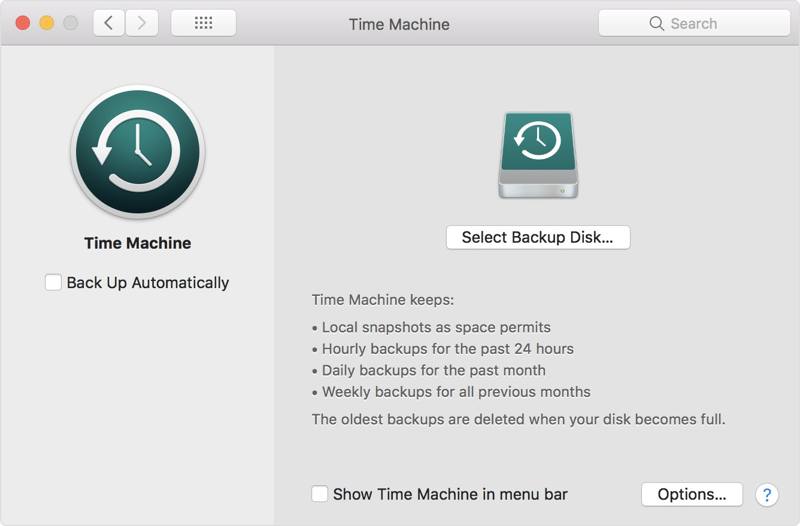
Step 1. Connect an external storage device to your Mac.
Step 2. Click the Apple menu, choose System Preferences, and pick Tim Machine.
Step 3. Hit Select Backup Disk, select the external device, click Use Disk, and hit Back Up Now to begin Mac backup before clearing a Mac computer.
Using iCloud
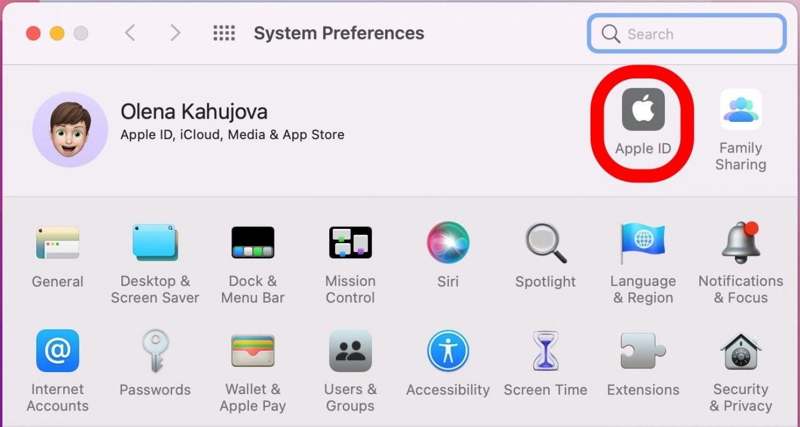
Step 1. Click the Apple menu, and choose System Preferences.
Step 2. Click Apple ID, choose iCloud, and enter your Apple ID and password to sign in to your iCloud account.
Step 3. Next, deselect Optimize Mac Storage, and select the apps that you wish to back up under Apps on this Mac using iCloud.
Sign out of Your iCloud Account
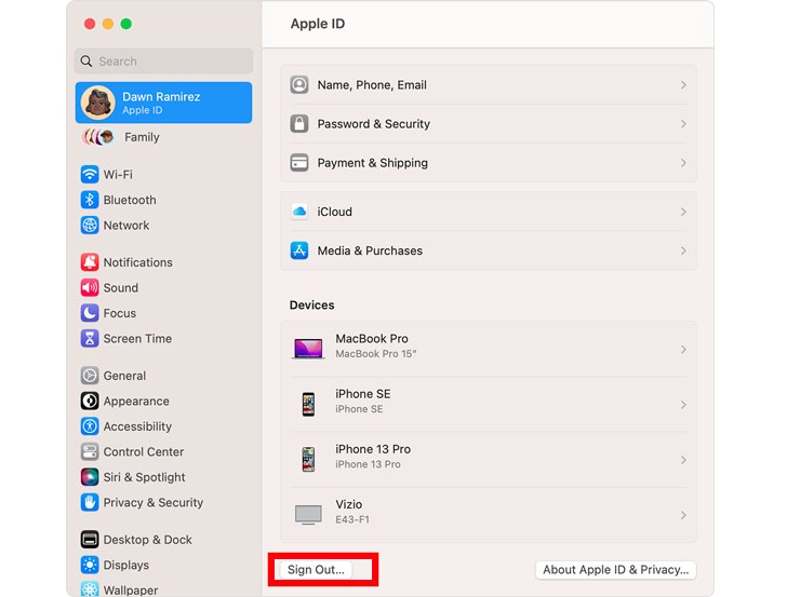
Step 1. Click the Apple menu, choose System Preferences or System Settings, and click Apple ID.
Step 2. Click Overview under your name on the sidebar.
Step 3. Hit the Sign Out button at the bottom. If prompted, enter your Mac password or Apple ID password.
Sign out iMessage on Mac
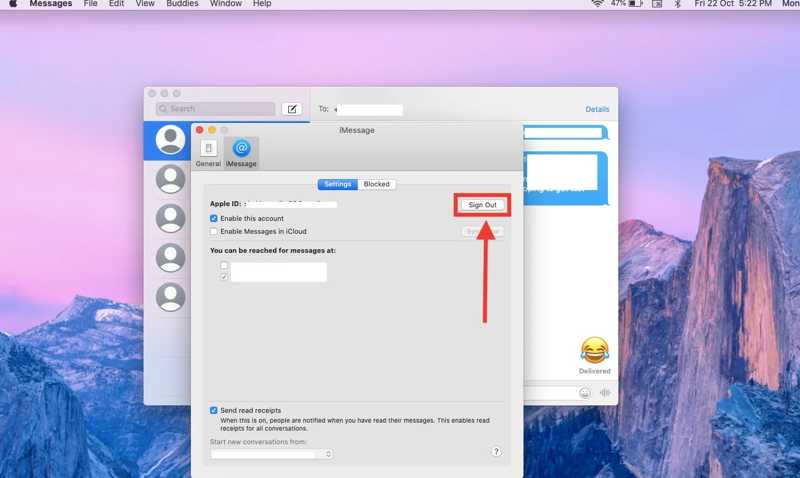
Step 1. Press Command + Space Bar on your keyboard to activate the Spotlight Search box. Type in messages and open the Messages app.
Step 2. Go to the Messages menu on the menu bar, and choose Preferences.
Step 3. Next, switch to the iMessage tab, and click the Sign Out button. Then enter your Apple ID credentials or Mac password to verify your ownership.
Note: If your Mac connects to Bluetooth devices or Apple Watch, make sure to unpair them.
Part 2: How to Wipe a Mac
Once you are ready, you can erase all content and settings on your MacBook with the built-in features. As mentioned previously, the workflows are different depending on your chip and Mac version. We demonstrate them respectively below.
How to Wipe a Mac with Apple T2 Chip
On macOS Ventura or Later
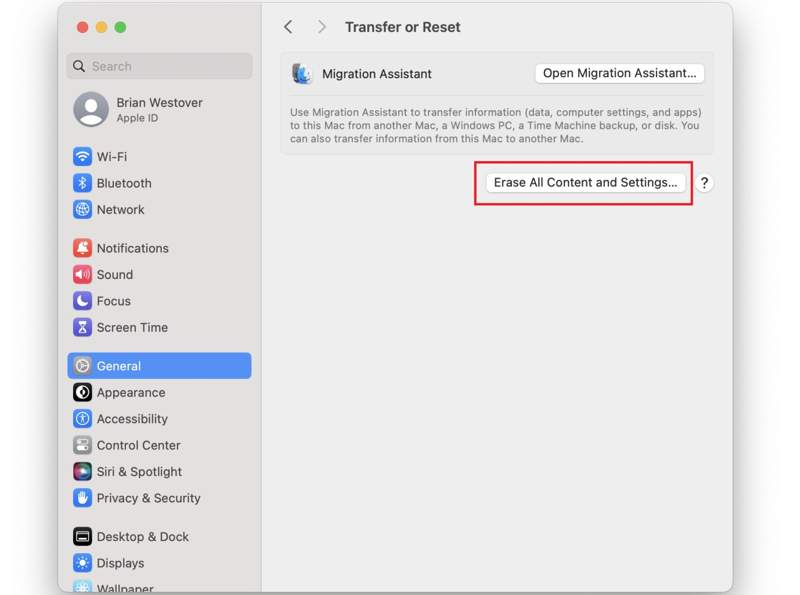
Step 1. Click the Apple menu, go to System Settings, choose General, and click Transfer or Reset.
Step 2. Hit Erase All Content and Settings.
Step 3. Then enter your Mac password and confirm the action.
On macOS Monterey
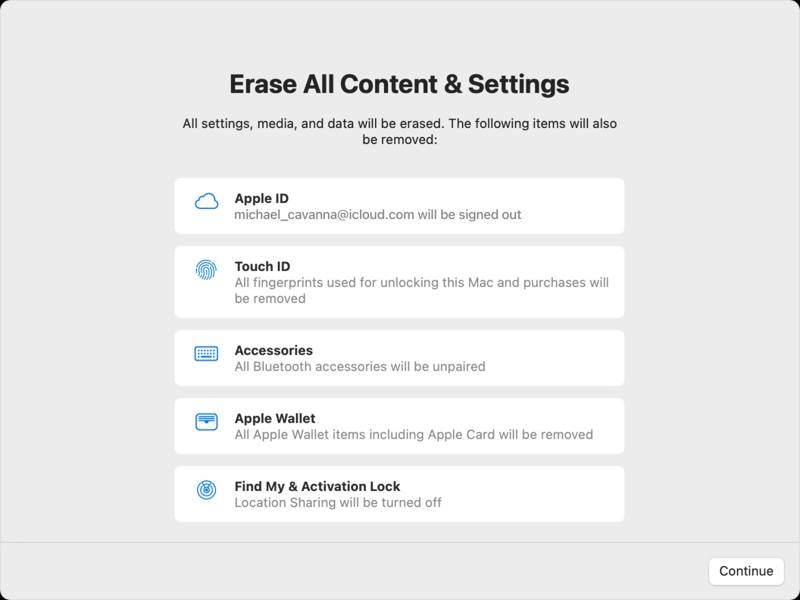
Step 1. Go to the Apple menu, and choose System Preferences.
Step 2. Click Erase All Content and Settings, and enter your admin password to enter Erase Assistant.
Step 3. Check what will be erased, click the Continue button, and follow the instructions to complete cleaning your MacBook. This method can also erase your iPhone.
How to Erase a Mac Without a T2 Chip or Running macOS Big Sur or Older
Step 1. Reboot your Mac, and hold down the Command + R keys once it starts to reboot.
Step 2. Choose Disk Utility on the macOS Utilities window, and click Continue.
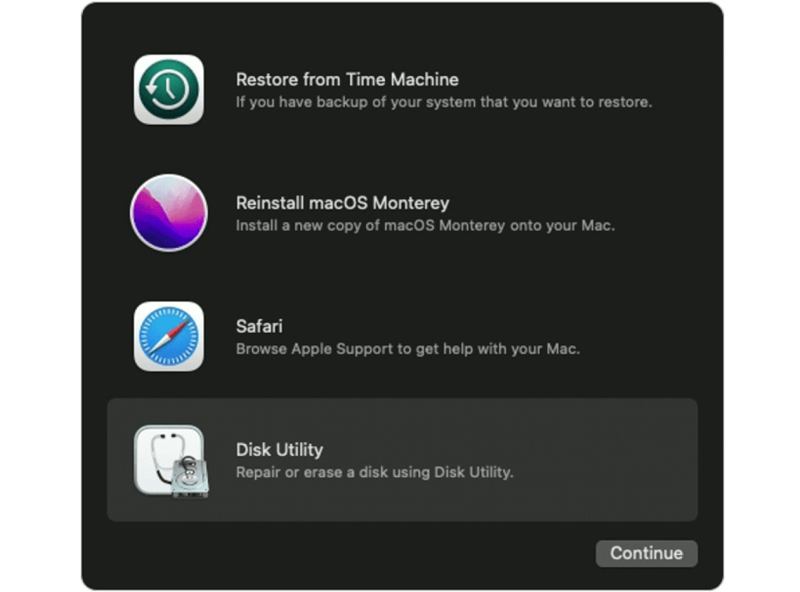
Step 3. Next, select your startup disk from the drop-down list on the Disk Utility dialog, and click the Erase button.
Step 4. Choose APFS if you are using macOS High Sierra or newer. If you are using macOS Sierra or older, choose Mac OS Extended.
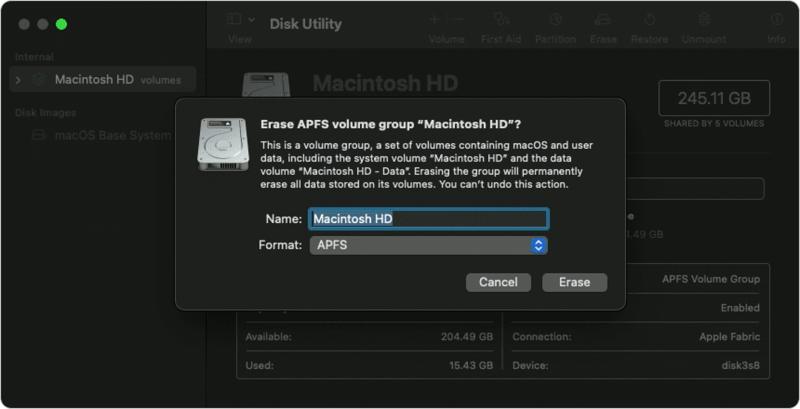
Step 5. Then keep GUID Partition Map in the Scheme option, and hit Erase to confirm.
Step 6. Select Reinstall macOS, and click Continue in the macOS Utilities window. Then select the startup hard disk, and click Continue.
Step 7. Once erasing a Mac finishes, your machine will restart and display the setup screen.
Part 3: How to Delete Files on Mac Without Resetting
If you just want to delete files on Mac to free up space and improve performance, the factory reset is not necessary. Apeaksoft Mac Cleaner can help you manage large and old files on your machine. More importantly, the app is pretty simple to use.
Best Way to Delete Files on Any Mac Computer
- Scan large and old files on your Mac quickly.
- Delete multiple files on Mac with a single click.
- Erase Mac files without recovery.
- Preview files before deleting them from Mac.
- Compatible with macOS 10.12 and above.
Secure Download

How to Delete Files from a Mac Computer
Step 1. Install Mac Cleaner
Launch the best Mac cleaner application once you install it on your computer or laptop. You can download it for free and open it from your Applications folder.
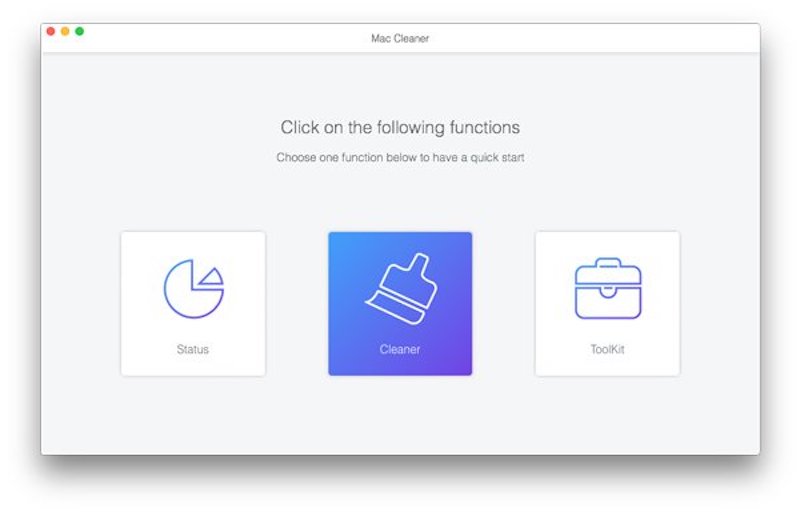
Step 2. Scan files on the Mac
Click the Cleaner in the home interface, and you will get all the tools for freeing up space. To delete files on Mac, choose Large & Old Files. Next, click the Scan button to begin looking for files and documents on your hard disk. It may take a while if you have lots of files. When it finishes, click the View button to move on.
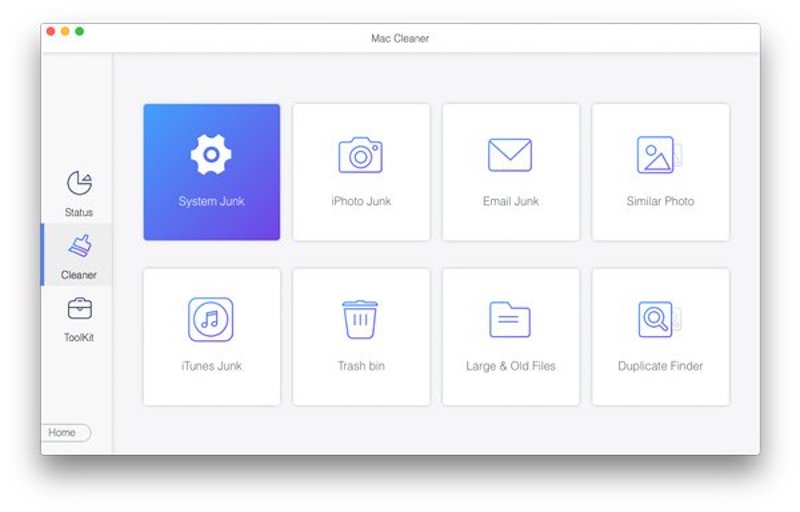
Step 3. Delete Mac files
Then you can find the desired files with filters, like >100MB, 5MB to 100MB, >1Year, and >30 days. Next, check the files on the right panel. You can quickly arrange files with the Sort By option or search for specific files with the Search bar. At last, check the box next to each unwanted file, and click the Clean button on this Mac cleaner.
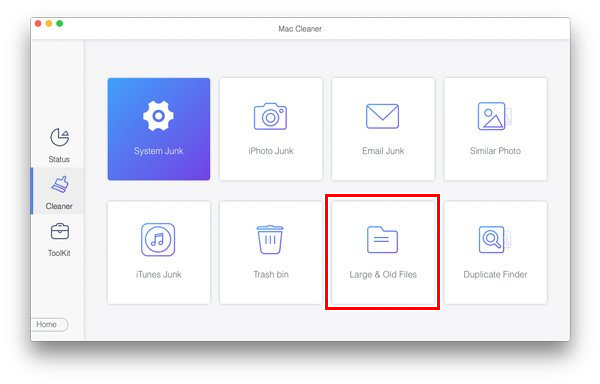
Conclusion
Now, you should understand how to erase MacBook running various macOS versions. Before that, you’d better make a backup and sign out your account. Apeaksoft Mac Cleaner is the best option for average people to remove files on a Mac without a factory reset. If you have other questions about this topic, please feel free to leave a message below this post.
Of course, you can try to delete a user on Mac to wipe a Mac.
Related Articles
Come and find out how to clear unnecessary caches and cookies on Mac to promote system performance and user experience.
Want to know how to record video or audio on Mac? In this article, we list 2 best ways to help you to get the video and audio capture on Mac easily.
Delete single, multiple, or all messages on Mac requires different operations. It is also accessible to delete messages only on Mac.
When iMessage not working on Mac, such as files not syncing between Mac and iPhone, not showing contact names on Mac, here is the troubleshoots you should know.

